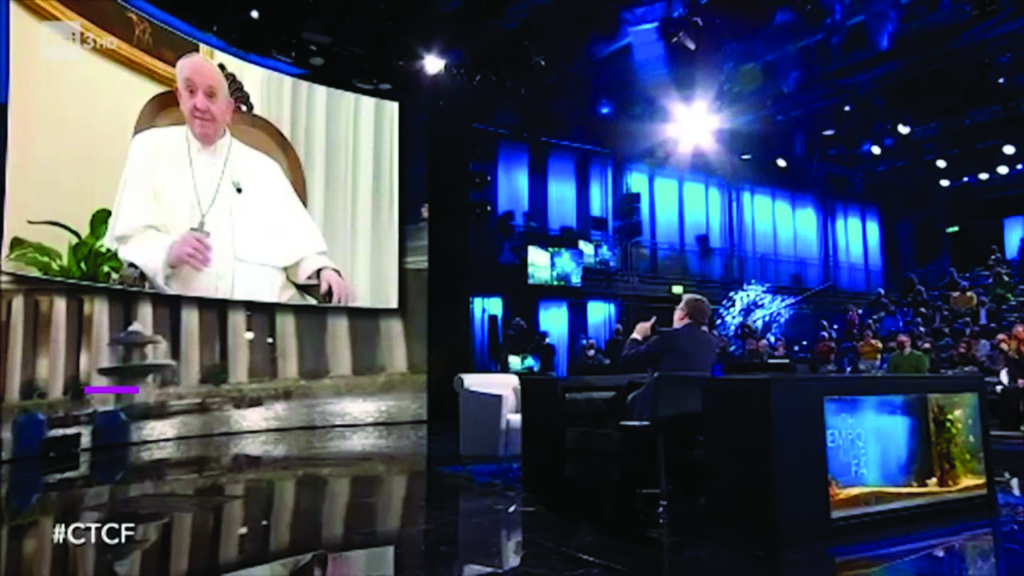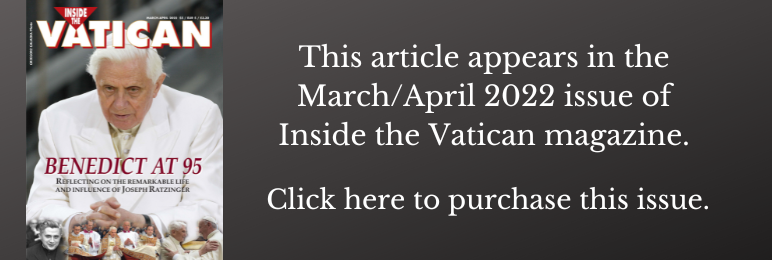 Pope Francis appeared on Italy’s RAI3 television station February 6 to respond to questions posed by host Fabio Fazio on the program “Che tempo che fa.”
Pope Francis appeared on Italy’s RAI3 television station February 6 to respond to questions posed by host Fabio Fazio on the program “Che tempo che fa.”
In the interview, Pope Francis lamented what he called a “culture of indifference” to the sufferings of migrants and the trafficked. “But what is done with migrants is criminal. To get to the sea they suffer a lot. There are videos on the concentration camps, I use this word seriously, concentration camps in Libya, the concentration camp of traffickers. What do those who want to flee suffer in the hands of traffickers… Then they risk crossing the Mediterranean. And then, sometimes, they are rejected, for someone who has the local responsibility and says ‘No, they don’t come here’; and there are these ships that go around looking for a port: ‘No, let them come back and die on the sea.’”
Asked about ecological concerns, Pope Francis responded, “We know what a deforestation policy means: it means less oxygen, it means climate change, it means the death of biodiversity, it means killing Mother Earth and not having that relationship that the aboriginal peoples, the original peoples have with the Earth, which they call “the good to live ”…that is, living in harmony with the earth.”
The Pope went on to answer a question about the goodness of men, saying, “God made us good but free. And that freedom is what is capable of doing harm. That freedom is capable of doing so much good and also so much evil. We are free, aren’t we? In the myth of Creation it is written: ‘Do not do this, because this would happen. And you did this, and you get sick.’ And as [God] made us free, we are masters of our decisions and also of making bad decisions. This is the freedom that God has given us.”
Regarding forgiveness, he said: “I will say something that perhaps someone is scandalized by, but I will tell the truth: the ability to be forgiven is a human right. We all have the right to be forgiven if we ask for forgiveness. It is a right that arises precisely from God’s own nature and has been given as an inheritance to men. We have forgotten this: that whoever asks me for forgiveness has the right to be forgiven. ‘Ah, you did it? Pay it! ‘. No! You have the right to be forgiven, and if you have any debt to society, arrange to pay it, but: with forgiveness.”
When Mr. Fazio questioned Francis on the future of the Church, he replied, “I have only tried to indicate the path of the Church towards the future: a Church on pilgrimage. And today the greatest, greatest evil of the Church is spiritual worldliness. A worldly Church. A great theologian, Cardinal de Lubac, said that spiritual worldliness is the worst of evils that can happen to the Church, even worse than the evil of libertine Popes…this spiritual worldliness within the Church causes an ugly thing to grow which is clericalism, which is a perversion of the Church.”
On a personal note, Mr. Fazio asked the Pope if he ever feels alone, and if he has personal friends. “For this,” replied Francis, “is one of the reasons why I did not go to live in the pontifical apartment, because the Popes who were there before were saints and I don’t get along so well, I’m not so holy. I need human relationships, which is why I live in this hotel in Santa Marta where there are people, you talk to everyone, you find friends. It’s an easier life for me.”







Facebook Comments